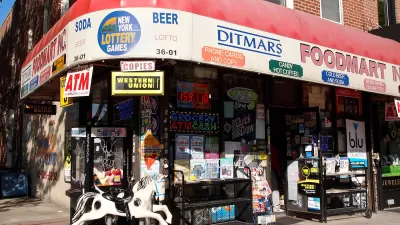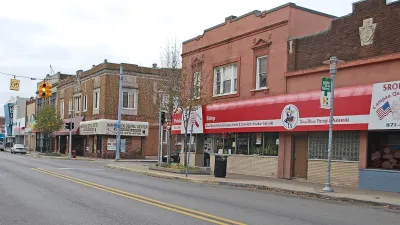A Burlington program is using grocery trolleys to remind residents that, for many of them, a grocery store is less than a mile away.

Pointing to the fact that 90 percent of Burlington residents live within 1,500 steps from a grocery store, Net Zero Vermont is encouraging people to walk, rather than drive, when making short grocery trips, according to a Burlington Free Press article by Kate O’Farrell.
To promote this concept, a program called Walk to Shop sells rolling trolleys designed to bring groceries home more efficiently. “Walk To Shop is working to show that many people live close to grocery stores and want to raise awareness and make walking to shop a possibility through their grocery trollies.”
O’Farrell describes the program, which started in 2021 with funding from the Vermont Agency of Transportation's 2020 Mobility and Transportation Innovation Grant. “The program sells two versions of trollies, a medium-sized trolley for $40 with a 40 pound capacity, and a larger size for $50 that can handle 50 pounds,” solving a key issue for shoppers. “The trollies encourage people to walk because even if you live close to a grocery store, lugging heavy bags is a roadblock that stops people from walking.”
Considering that “The U.S. Environmental Protection Agency reports that 10 billion miles are driven each year in the United States for trips under a mile,” Reducing the number of short trips taken by car can have a significant collective impact on greenhouse gas emissions, pollution, and congestion.
FULL STORY: How a trip to the grocery store can be a tool for sustainability

Alabama: Trump Terminates Settlements for Black Communities Harmed By Raw Sewage
Trump deemed the landmark civil rights agreement “illegal DEI and environmental justice policy.”

Study: Maui’s Plan to Convert Vacation Rentals to Long-Term Housing Could Cause Nearly $1 Billion Economic Loss
The plan would reduce visitor accommodation by 25% resulting in 1,900 jobs lost.

Planetizen Federal Action Tracker
A weekly monitor of how Trump’s orders and actions are impacting planners and planning in America.

DC Extends Application Window for Outdoor Dining Permits
District restaurants will have until the end of November to apply, but businesses with permits in rush hour parking lanes must end operations on July 31.

Wind Energy on the Rise Despite Federal Policy Reversal
The Trump administration is revoking federal support for renewable energy, but demand for new projects continues unabated.

Passengers Flock to Caltrain After Electrification
The new electric trains are running faster and more reliably, leading to strong ridership growth on the Bay Area rail system.
Urban Design for Planners 1: Software Tools
This six-course series explores essential urban design concepts using open source software and equips planners with the tools they need to participate fully in the urban design process.
Planning for Universal Design
Learn the tools for implementing Universal Design in planning regulations.
Caltrans
Smith Gee Studio
Institute for Housing and Urban Development Studies (IHS)
City of Grandview
Harvard GSD Executive Education
Toledo-Lucas County Plan Commissions
Salt Lake City
NYU Wagner Graduate School of Public Service





























